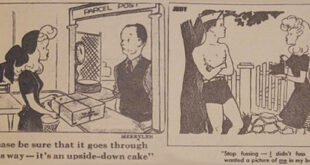If you’ve ever worked in an office, or if you’ve ever been in a fender-bender, you’ve played a little game called “He Said She Said.” You both argue until blue in the face, but since neither of you has definitive proof of what happened, neither of you can settle the dispute. If only I had better proof than that no-good rotten so-and-so…
In genealogy, you may not have arguments per se, but you are looking into your family tree and you are not a professional genealogist. You’re just a regular person. So when someone else looks into the same family tree, they’re just a regular person too. You and cousin Anna disagree on when Anna’s mother was born. Who is right? Another game of “He Said She Said.”
This is why having your source is so important. You can confirm the information you know, or thought you knew. You can also end up confirming that cousin Anna was right all along and you have to correct your records. In either case, it’s more important to have the right information and the source.
There may be many different sources for a piece of information. You need to find the best source to back you up. The simple theory on sources is that you want to find the source that is the most thorough, and was created the closest to the original event.
When I started my genealogy, I marked down my grandmother’s date of birth, November 15th, 1904. No question mark! What was my source? Well, my mother had an old book she used to keep track of birthdays. I didn’t realize the importance of my sources at the time. I could have used my father’s testimony as a source, because her birthday was always November 15th all the years he grew up. A couple of years later, I found the baptism records of her family’s parish church, and lo and behold she was baptized on November 6th and born on November 5th!! She used the wrong birth date her entire adult life, on all official paperwork, social security, drivers license, even her citizenship applications! She is no longer here to ask why she changed her birth date, but the reason is not important. Ultimately, once she used November 15th on an official government document, she had to use the same date on every other document. If the dates didn’t match, it could be called into question. So the wrong date ended up on dozens of official documents.
You want a source that is the closest official source to the original event, which was her actual birth. The two official sources that are the best are her actual birth certificate or her baptismal record at the local parish church. These were written the week she was born. Nobody was fudging their ages. Nobody was working from memory many years after the fact. The county clerk has no compelling reason to lie, and neither did her parish priest.
I’m not expecting you to just jump right in and locate a birth certificate in Italy. We need to do more prep work here before we make the great leap back to Italy.
For each event, there are better sources and weaker sources. In some cases, you might never find Nonna’s birth certificate. So you have to live with a date from a source that is not as good. But the important thing is that you document that source in your research.
In my example, I used the testimony of a living person and other documents she filled out, and they all turned out to be wrong. This is not normally the case, but it is a good thing the original baptism record still exists. If you cannot find an original birth certificate or baptism record, you may have to settle for using other types of documents. You should use documents that were written for a government official, because there would be a little more fear in most people that they should not lie on an official form. If you happen to find a credit card application, or an entry in a family Bible written years after the fact, there is little fear that an incorrect birth date will lead to being deported!
There are times when there is a very small paper trail left by an individual, especially for women who did not have to fill out a lot of paperwork (their husbands did!) Sometimes, the only source for a birth date is the death certificate. This is usually the least reliable source for a birth date. First of all, the certificate might have been filled out by a hospital official who is not a family member, and if your relative was unconscious when brought to the hospital, there might not be reliable information. Even if your Uncle was the informant on the death certificate, you must remember that this is a moment of great personal stress because a loved one has just died, and people do not always have the best recollection of dates under such duress. For the same reasons, the birthplace and even the maiden name are not always accurate. Usually the date of death, cause of death and burial information are the most accurate items on the death certificate, because the events just happened. Once in a while, even the cemetery name is incorrect on the death certificate, usually because a relative changes their mind on where the person should be buried after the certificate is filed.
Most genealogists with a little experience usually learn all these clues about sources, and as long as you cite your sources on your research, they will understand the reliability issues we discussed here.
In computer software, there is always a place to enter your sources. Usually you enter the source in a master source list, and you can even scan a copy of the source itself to include in the computer file. Then you can refer to that master source for many different pieces of information (maiden name, birth date, birthplace, etc.) Next to the piece of information, you choose the source. Most genealogy software programs will even let you run a report of information that does not have a source, which is a good way to check yourself and make sure you start out with a well-sourced genealogy.
So, to recap, you should use government or church sources when possible, filed as close to the date of the event as possible to ensure that the data is correct. The later the document was filed, the less accurate it tends to be. Personal recollections are useful but they should be trusted the least when it comes to dates. When you get into a “He Said She Said” with your cousin, show them your source and ask them for theirs. Somebody will end up enlightened at the end.
Write to Dan at italianroots@comcast.net and please put “Fra Noi” in the subject line.
 Fra Noi Embrace Your Inner Italian
Fra Noi Embrace Your Inner Italian






